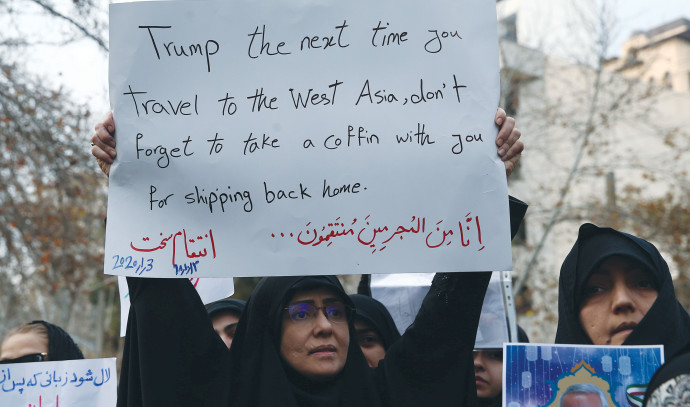The Biden administration released a $10 billion sanctions waiver for the Iranian regime on March 13 in a dramatic shift from its exchange with Iranian proxies less than two months ago.
On January 28, Iranian-backed Iraqi Shia militias launched a drone strike in northeast Jordan, killing three US troops and injuring 34 others. The US retaliated on February 3, striking upwards of 85 Islamic Revolutionary Guard Corps (IRGC) and Iranian proxy militia targets across western Iraq and eastern Syria.
Though the reissued waiver includes threats of G7 sanctions if Iran continues supplying Russia with ballistic missiles, the White House’s conflicting policy with Iran points to its fundamental misunderstanding of the Iranian threat.
The ayatollah’s theocratic dictatorship espouses the destruction of Israel, anti-American hostilities, and the export of its Twelver Shi’ite ideology to create a hegemonic Muslim theocracy in the Middle East. To Western ears, where the separation of church and state is deeply ingrained in policy and opinion, these goals are irrational and implausible, despite Iran’s deployment of the IRGC and its network of proxy militias in Iraq, Syria, Lebanon, the Gaza Strip, and Yemen against Israel, Western targets, and Sunni opposition.
Deterrence is only possible upon comprehension of the threat at hand. Will the US wait to seriously respond to Iran’s threats till the regime achieves the means to execute its religious vision, such as a nuclear arsenal?
Since the 1979 Iranian Revolution, US administrations have failed to inflict proportionate costs to Iranian provocation. From 2021 to March 2023, the US retaliated only thrice to 78 Iranian-backed attacks on US targets. The February 3 retaliation followed more than 170 against American targets in the Middle East post-October 7.
The US believes restraint against Iranian provocation will lure Iran into cooperation and avoid regional conflagration. Yet Iran is committed to its religious goals underpinning its strategic action, playing the long game by slowly building dominance through its military and anti-Israel and anti-Western campaigns.
The Iranian regime is notorious for its rejection of liberal democratic values, but many Americans are unaware of its title for the US: “The Big Satan.” Upon its establishment, the Iranian regime institutionalized anti-American sentiment in its identity, motivated in part by “Western imperialism” and the Shia principle of mazloumiat, compelling the oppressed to rise against oppressors.
Perhaps more radical than its anti-American ideology is the regime’s doctrine toward Israel, “The Little Satan.” Mahdism in Twelver Shi’ism is the return of the 12th Shia imam, Muhammad al-Mahdi, whom Twelvers believe will rid the world of evil in a final battle with themselves as victors. During the Iranian Revolution, Ayatollah Ruhollah Khomeini reframed the Mahdi doctrine to position Jerusalem as the location of Mahdi’s reappearance, thus necessitating the liberation of Jerusalem as a prerequisite for Mahdi’s return.
Despite decades of evidence of the regime’s theologically motivated violence, the US continues to concede and appease Iran’s means by failing to understand its dedication to its ends. US administrations repeatedly seek to strengthen relations, rely on the Joint Comprehensive Plan of Action, and impose sanctions, but these measures have proven ineffective. If left unchecked, a nuclear-armed Iran will further destabilize the Middle East and form a strong anti-Western military bloc with Russia and the Chinese Communist Party.
A shift from diplomacy to force
The US must no longer rely on traditional diplomatic measures to influence Iranian behavior. To prevent a total collapse of the Middle East, particularly with the advent of Iran’s nuclear armament, the US must demonstrate its willingness to use force to impose damaging costs on the Iranian regime in response to Iranian-sponsored violence.
An example of strong US retaliation is the 2020 assassination of IRGC Quds Force Commander Qassem Soleimani, which slowed proxy activity until the reported retaliatory October 7, 2023, strikes against Israel.
To proportionately engage the Iranian threat to maintain stability in the Middle East, the US must act according to the regime’s religious ideas, for as Ayatollah Khomeini once said, “Anyone who will say that religion is separate from politics is a fool; he does not know Islam or politics.”
The writer is a communications specialist at the Philos Project, focusing on Western engagement with the Near East. X: @_SusannaHoffman







